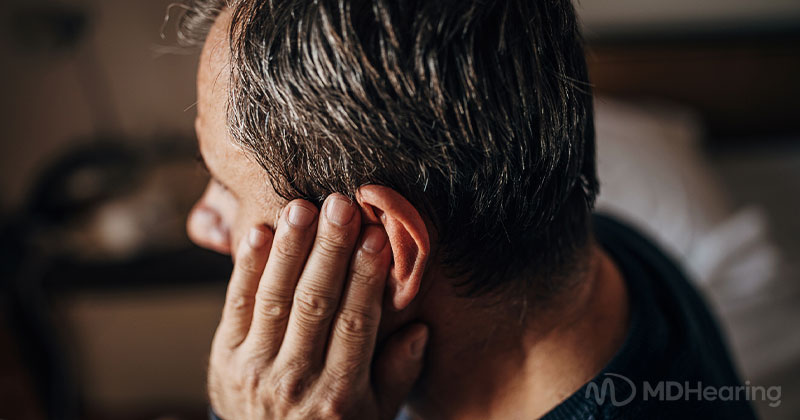Are you having trouble communicating on the telephone lately? Or does your spouse tell you the television is too loud? These—and many other signs—could be indications that you are struggling with hearing loss.
Prevention and early detection of hearing loss are important. When left unaddressed, it can lead to other health problems. If you notice any signs of hearing loss, get your hearing tested and take steps to prevent further loss.
This article will go over the various signs of hearing loss, as well as the different types of hearing loss, causes, and possible treatments.
10 Common Signs of Hearing Loss
Hearing loss can be difficult to recognize because it often happens gradually. However, having some knowledge of what to look for can help you identify early symptoms.
If you’ve experienced any of these signs, you may have hearing loss:
1. Conversations are hard to follow
Hearing loss may be most noticeable when you're having conversations, particularly when more than two people are speaking. This can be even more prominent when you're in a noisy setting like a crowded restaurant or talking with soft-spoken people.
2. People seem to be mumbling
Speech seems muffled or unclear, making it challenging to be a part of conversation, and possibly making you feel isolated.
3. Difficulty talking on the phone
Like face-to-face conversations, phone conversations can also be a challenge. When talking over the phone, the person on the other end may sound unclear or like they’re mumbling.
4. Asking others to repeat themselves or to speak up
You frequently find yourself asking people to repeat themselves. Additionally, you may request they speak louder, slower, and clearer so you can better understand them.
5. Turning up the volume on the TV or radio
You may not realize it, but you might be turning up the TV or radio to an unhealthy volume level. Subsequently, your spouse, children, or other people in the home may complain that it’s too loud.
6. Trouble hearing high-pitched sounds
High-pitched sounds, such as bird chirps, doorbell chimes, cell phone ringtones, and alarm clocks, are difficult to hear.
7. Inability to hear consonants
You are not able to distinguish the difference between certain consonants, such as "s" and "f," "p" and "t," or "sh" and "th."
8. Ringing in the ear
Ringing in the ear (also called "tinnitus") is a common condition that affects people with hearing loss. This ringing or buzzing sound may be mild and occasional. However, in severe cases, it can be blaring, long-lasting, and diminish your quality of life.
9. Hypersensitivity to certain sounds
Some people with hearing loss are also hypersensitive to some sounds or feel that sounds get very loud very quickly. When this happens, certain sounds might be painful or annoying.
10. Falling or having trouble balancing
Your hearing and balance are connected, so when you have hearing loss, it can be difficult for you to maintain stability. You may even experience vertigo, which is a condition that causes dizzy spells.
Types of Hearing Loss
Hearing difficulties are common, especially as you get older. According to the National Institute on Deafness and Other Communication Disorders (NIDCD), approximately 37.5 million American adults ages 18 and over have trouble hearing. About one in three Americans between the ages of 65 and 74 has hearing loss. Of those older than 75, nearly half are hard of hearing to some degree.
The level of hearing loss you have—mild, moderate, moderately-severe, severe, or profound— is determined by your ability to hear certain frequencies (Hz). A decibel chart can help you get a good idea of the sounds heard at different levels.
There are three general types of hearing loss:
-
Sensorineural hearing loss (damage to inner ear)
-
Conductive hearing loss (blockage in the outer or middle ear)
-
Mixed hearing loss (a combination of the two)
Sensorineural hearing loss is the most common type and usually involves irreparable damage to the nerve cells of the inner ear. This is the type of hearing loss people usually experience as they age.
Age-related hearing loss, also called "presbycusis," is one of the most common medical conditions affecting older adults. This typically occurs in both ears—little by little over time—as you get older. Due to genetics, age-related hearing loss tends to run in families, according to the National Institute on Aging (NIA).
Causes of Hearing Loss
There are numerous causes of hearing loss. These include:
-
Age
-
Loud noises
-
Fluid and ear wax buildup
-
Injuries and infections (e.g., ruptured eardrum, measles, mumps)
-
Ototoxic medications
-
Heredity
-
Tumors and other abnormal growths (e.g., otosclerosis)
-
Diseases and other medical conditions (e.g., Meniere’s disease, stroke, diabetes, high fever)
Regardless of the cause, it's essential to seek treatment for your hearing loss. Issues left unaddressed can have detrimental health effects, including further damage to your ears, worsened hearing loss, balance problems, an increased risk of falls, and social isolation.
Hearing Loss Prevention and Treatment
Some common causes of hearing loss, such as loud noises and ototoxic medications, are preventable, according to the World Health Organization (WHO).
-
Protect your ears from loud noises: Exposure to loud noise can damage the tiny hair cells in your inner ears, resulting in permanent hearing damage. You can prevent most noise-related hearing loss by limiting the volume on your devices, moving away from loud noise, using noise-canceling earphones/headphones, and wearing earplugs.
-
Avoid ototoxic medications: Use of these medications can also damage sensory cells in the inner ear, which are responsible for hearing and balance, and may lead to temporary or permanent damage. When you can, avoid ototoxic medications such as certain antibiotics (gentamicin); chemotherapy drugs (cisplatin and carboplatin); salicylate pain relievers (aspirin); malaria drugs (quinine); and kidney and heart medications (diuretics).
While conductive hearing loss is often temporary or reversible, sensorineural hearing loss is permanent, which is why it's vital to test your hearing regularly.
As the most common treatment for hearing loss, hearing aids can help you hear what you are missing, clarify speech, provide more awareness of your surroundings, and improve your overall quality of life. Fortunately, hearing aids have recently become available over the counter and without a prescription. Now, the cost of hearing aids is no longer an obstacle for most people.
Do You Have Signs of Hearing Loss?
If you or someone you know is experiencing any of these signs of hearing loss, it's time for a hearing test. You can check your hearing at a local hearing clinic or from the comfort of your home. Simply take the MDHearing free online hearing test and receive your results immediately.
At MDHearing, we offer several affordable FDA-registered hearing aids designed to help you hear better. Starting at just $299 per pair, every MDHearing medical device is backed by U.S.-based support from licensed hearing professionals and a 45-day free trial, so there's no risk in trying them.
Take our free online hearing test and get results immediately.
TAKE ONLINE HEARING TEST

